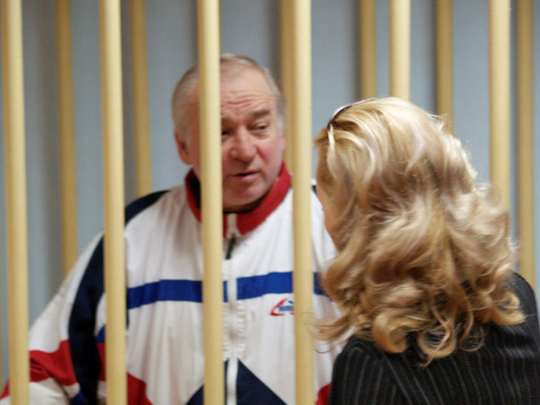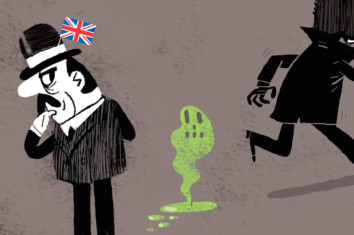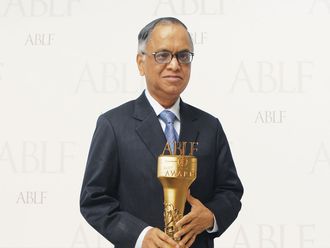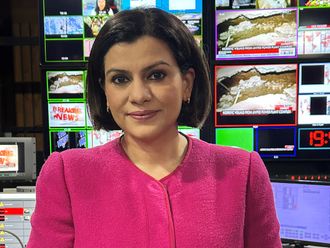
On a wall of GCHQ’s [Government Communications Headquarters, an intelligence and security organisation of Britain] sprawling donut-shaped office in Cheltenham, there is a large screen showing a map of the world — and of cyber-attacks. It seems to show digital missiles being fired every few seconds from Russia and China, hitting targets in Britain and America. But as the spies know, this is little more than educated guesswork. There’s no doubt that the governments of both countries sponsor hacking of Western businesses on an industrial scale, but the serious cyber-attacks are so well disguised that it’s almost impossible to trace where they came from. Without proof, it’s hard to complain — or retaliate.
In the Cold War, things were relatively simple: it was one government versus another, their armies (and spies) against ours. But the rules of engagement have changed.
The globalisation of organised crime has created a new breed of well-financed, well-connected Mafia bosses with capabilities as strong as those of many governments. One might suspect the Russian mob acts with the Kremlin’s backing, but in this new cold war, the secret is to strike with plausible deniability. In hacking, and with murder.
The most likely explanation for the attack on Sergei Skripal is that it was carried out on the Kremlin’s orders — likely, because it fits a pattern. Vladimir Putin’s enemies have a habit of meeting strange, violent deaths — as befits the rules of a country with a long tradition of political assassination. Unusual weapons have long been the Kremlin’s calling card: an ice-pick (Trotsky), a poisoned umbrella tip (Georgi Markov) and radioactive polonium (Alexander Litvinenko). So the use of nerve agent on Skripal and his daughter is, for many, enough to prove Putin guilty.
But hard evidence, in such cases, seldom emerges. After years of investigating the Litvinenko case, the best the official inquiry could say was that his Russian assassins were “probably” instructed by Putin. The assassins were named: ex-KGB agents Andrei Lugovoi and Dmitry Kovtun. Their sloppiness left a trail of polonium, from the teapot they used to pour their victim poisoned tea to the aircraft that took them from Moscow. But who instructed them? There, the trail runs cold.
David Cameron did very little in retaliation: the Kremlin denied having anything to do with the murder, and he could not prove otherwise.
With the Skripal case, there are several other plausible explanations. He could have been caught up in the Russian underworld. As the Litvinenko family’s lawyer said, there is vanishingly little difference between the behaviour of mobsters and the FSB (the successor organisation to the KGB) so what looks like a government hit might well be the mafia. They operate with the same method — sometimes, the same people.
So it’s quite possible that this was not Putin, but someone seeking to please him. He’s famously relaxed about his enemies being murdered. Boris Nemtsov was gunned down while walking with his girlfriend on a bridge near the Kremlin — an audacious hit, given how many security cameras are in the area. But, mysteriously, none of them seemed to be working that night. Nor were there police patrols. The journalist Anna Politkovskaya’s investigation into Putin’s corruption was brought to an end with her assassination. Sergei Magnitsky, a lawyer who had been investigating corruption, was found dead after 11 months in prison.
From the West, it can seem bizarre: doesn’t Putin have a reputation to protect? He does: the reputation of someone whom it’s best not to mess with. Someone who can wait a decade, perhaps more, for vengeance. This is an election year in Russia, and the Putin promise is that he’s a strong leader who is ruthless with enemies and restoring national pride. The fate of Skripal will be seen, by Putin’s allies, as yet another warning to his enemies.
Popular opinion on such matters is very different. Litvinenko’s murder was cheered from the floor of the Russian parliament, with one lawmaker giving thanks for the fact that “the traitor has met the punishment he deserves”. Lugovoi is written about now more as a celebrity than a criminal, having got remarried (to a go-go dancer) in a lavish wedding on the Black Sea. He now sits in parliament himself, and three years ago he was granted a state medal “for services to the fatherland”. He embodies the point that being accused of murdering Putin’s enemies does not harm your career.
So Putin doesn’t need to order assassinations: he has arranged things where accidents befall his enemies and everyone knows about it. In this, and in much else, he has developed deniability into an art form. From the soldiers sent into Crimea in unmarked uniform to the supposedly independent computer hackers who menace Estonia, it is often impossible to say with certainty that the Kremlin is involved. So there is the perfect excuse for Britain to do nothing, and pretend it hasn’t seen anything.
But with a policeman lying in hospital, almost killed by a nerve agent that was probably developed in a laboratory run by a foreign government, it’s harder to do nothing. Even to go through the motions of expelling Russian diplomats, as happened after Litvinenko’s murder, will not be enough: they will expel just as many of ours and things will go on as normal. Putin might well have concluded, last time, that British hunger for Russian money was greater than its concern about human rights.
But Russian interest in money is precisely where Britain’s real leverage lies. The ability to evacuate swindled wealth to safe havens in Britain is one that’s highly valued by plutocrats. And one of the few things Britain has done in recent years that has worried the suspiciously rich Russians are the “unexplained wealth orders” that allow police to investigate people over whom they have questions. Used properly, they could stop London being used as the playground of Putin’s cronies.
When Magnitsky, the lawyer, was found dead in his cell, the US Congress responded with the Magnitsky Act which allows the sanctioning of anyone caught up in human rights abuses. There was never any evidence that the Kremlin killed Magnitsky, but Congress didn’t wait for any — they just stepped up something they ought to have been doing anyway. Britain has these options, and more, but it has always been more hesitant. Something that those around David Cameron say that he now regrets.
Home Secretary Amber Rudd said that she’ll respond as soon as she has proof — but the whole point of such murders is that proof never arrives. This is a new kind of conflict, and deserves a new kind of response.
— The Telegraph Group Limited, London 2018
Fraser Nelson is the editor of The Spectator and a columnist for The Daily Telegraph.











